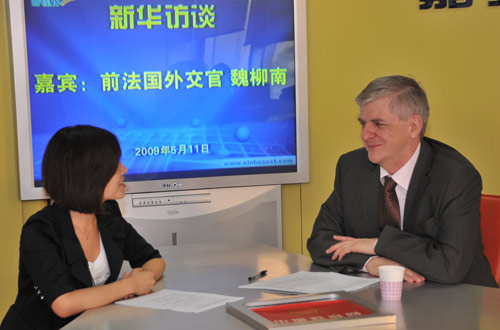"The western media's violent storm of criticism on China are rumors and slanders," said Lionel Vairon, CEO of the CEC Consulting and a former French diplomat.
 |
|
Lionel Vairon (R), CEO of the CEC Consulting and a former French diplomat, poses for a photo before the interview with Xinhuanet on May 11, 2009 in Beijing. [Xinhuanet] |
Vairon was reaffirming his critical view of the western media elaborated in his book "Threat of China?" during an exclusive interview with Xinhuanet on Monday.
Pointing out a reason for such a phenomenon is "the commercialization of the media," he said, "the media will think about the commercial interests first."
"Namely, when they want to sell the newspapers, they want to give the bad news, if it is good news, they don't sell the papers (well)."
As a result, he noted, "If you only talk good things about China, the newspaper won't have good sale; but if you are critical about it, then papers will be sold well."
Then, he said, the reporters also have a strong influence on the phenomenon. "Reporters need to write exclusive news articles very quickly," and "consequently the news is lack of or without in-depth analysis, which leads to generally simple and superficial views on some issues."
He said he also understands the reporters always need to stick to the main stream and have more critical views on what is happening. "If they write that China has made lots of progress especially during last year when the 29th Olympic Games were held, the editors-in-chief won't be very happy with it."
Vairon said it is true that the media's "capacity of analysis, sometimes, are not proper or enough," and the media know little about China and have very superficial view of China.
 |
|
Lionel Vairon (R), CEO of the CEC Consulting and a former French diplomat, speaks during the interview with Xinhuanet on May 11, 2009 in Beijing. [Xinhuanet] |
But on the other side of world, he added, "the people who are reading the articles have never been to China, those articles mislead their understanding of China, as the readers won’t analyze the news themselves."
However, he stressed, the current generation of European leaders are still young, who comparatively have less experience than the previous ones on dealing with diplomatic relations and international affairs.
"We have young generation of leaders who are much more influenced by the media reports, because they have less knowledge of international relations, they still need time to adjust themselves."
"I think the new leaders are less internationalized, they focus more on domestic issues and policies."
"I think when we look at what happened last year," Vairon said, referring to the relations between China and France, "the young leaders did not have good knowledge of China, they don't really understand, firstly what is going on in China, and secondly, they don't know how to manage the relations and how to communicate with China."
(Xinhua News Agency May 12, 2009)